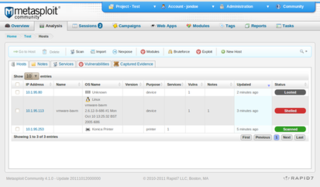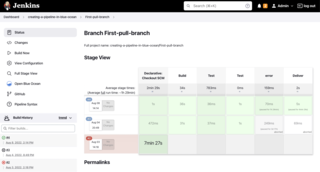Server-side scripting is a technique used in web development which involves employing scripts on a web server which produces a response customized for each user's (client's) request to the website. Scripts can be written in any of a number of server-side scripting languages that are available. Server-side scripting is distinguished from client-side scripting where embedded scripts, such as JavaScript, are run client-side in a web browser, but both techniques are often used together. The alternative to either or both types of scripting is for the web server itself to deliver a static web page.
Web development is the work involved in developing a website for the Internet or an intranet. Web development can range from developing a simple single static page of plain text to complex web applications, electronic businesses, and social network services. A more comprehensive list of tasks to which Web development commonly refers, may include Web engineering, Web design, Web content development, client liaison, client-side/server-side scripting, Web server and network security configuration, and e-commerce development.

The Metasploit Project is a computer security project that provides information about security vulnerabilities and aids in penetration testing and IDS signature development. It is owned by Boston, Massachusetts-based security company, Rapid7.

Aptana, Inc. is a company that makes web application development tools for use with a variety of programming languages. Aptana's main products include Aptana Studio, Aptana Cloud and Aptana Jaxer.
JSDoc is a markup language used to annotate JavaScript source code files. Using comments containing JSDoc, programmers can add documentation describing the application programming interface of the code they're creating. This is then processed, by various tools, to produce documentation in accessible formats like HTML and Rich Text Format. The JSDoc specification is released under CC BY-SA 3.0, while its companion documentation generator and parser library is free software under the Apache License 2.0.

GitHub is a developer platform that allows developers to create, store, manage and share their code. It uses Git software, which provides distributed version control of access control, bug tracking, software feature requests, task management, continuous integration, and wikis for every project. Headquartered in California, it has been a subsidiary of Microsoft since 2018.
Heroku is a cloud platform as a service (PaaS) supporting several programming languages. As one of the first cloud platforms, Heroku has been in development since June 2007, when it supported only the Ruby programming language, but now also supports Java, Node.js, Scala, Clojure, Python, PHP, and Go. For this reason, Heroku is said to be a polyglot platform as it has features for a developer to build, run and scale applications in a similar manner across most of these languages. Heroku was acquired by Salesforce in 2010 for $212 million.

Etherpad is an open-source, web-based collaborative real-time editor, allowing authors to simultaneously edit a text document, and see all of the participants' edits in real-time, with the ability to display each author's text in their own color. There is also a chat box in the sidebar to allow meta communication.

SonarQube is an open-source platform developed by SonarSource for continuous inspection of code quality to perform automatic reviews with static analysis of code to detect bugs and code smells on 29 programming languages. SonarQube offers reports on duplicated code, coding standards, unit tests, code coverage, code complexity, comments, bugs, and security recommendations.

Jenkins is an open source automation server. It helps automate the parts of software development related to building, testing, and deploying, facilitating continuous integration, and continuous delivery. It is a server-based system that runs in servlet containers such as Apache Tomcat. It supports version control tools, including AccuRev, CVS, Subversion, Git, Mercurial, Perforce, ClearCase, and RTC, and can execute Apache Ant, Apache Maven, and sbt based projects as well as arbitrary shell scripts and Windows batch commands.

Less is a dynamic preprocessor style sheet language that can be compiled into Cascading Style Sheets (CSS) and run on the client side or server side. Designed by Alexis Sellier, Less is influenced by Sass and has influenced the newer "SCSS" syntax of Sass, which adapted its CSS-like block formatting syntax. Less is an open source project. Its first version was written in Ruby; however, in the later versions, use of Ruby has been deprecated and replaced by JavaScript. The indented syntax of Less is a nested metalanguage, as valid CSS is valid Less code with the same semantics. Less provides the following mechanisms: variables, nesting, mixins, operators and functions; the main difference between Less and other CSS precompilers is that Less allows real-time compilation via less.js by the browser.
JSHint is a static code analysis tool used in software development for checking if JavaScript source code complies with coding rules. JSHint was created in 2011 by Anton Kovalyov as a fork of the JSLint project. Anton and others felt JSLint was getting "too opinionated", and did not allow enough customization options. The JSHint maintainers publish both an online version, and a command-line version.
Perforce Software, Inc. is an American developer of software used for developing and running applications, including version control software, web-based repository management, developer collaboration, application lifecycle management, web application servers, debugging tools, platform automation, and agile planning software.
Buddy is a web-based and self-hosted continuous integration and delivery software for Git developers that can be used to build, test, and deploy web sites and applications with code from GitHub, Bitbucket, and GitLab. It employs Docker containers with pre-installed languages and frameworks for builds, alongside DevOps, monitoring and notification actions.

Netlify is a remote-first cloud computing company that offers a development platform that includes build, deploy, and serverless backend services for web applications and dynamic websites.
Next.js is an open-source web development framework created by the private company Vercel providing React-based web applications with server-side rendering and static website generation.
A software bot is a type of software agent in the service of software project management and software engineering. A software bot has an identity and potentially personified aspects in order to serve their stakeholders. Software bots often compose software services and provide an alternative user interface, which is sometimes, but not necessarily conversational.
Semgrep, Inc. is a cybersecurity company based in San Francisco. The company develops the Semgrep AppSec Platform and actively maintains the open-source static code analysis tool semgrep OSS.








